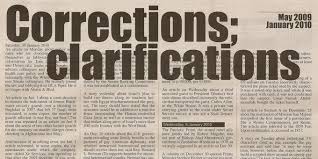Katie Gold
kg094517@ohio.edu
In today's world, information comes at us a mile a minute. Journalists across many platforms and media forms try their best to report news and information correctly as soon as it becomes available, however, expecting perfection in truth every time is simply unattainable in every situation.
Whether it be corrections based on evolving situations, information that has surfaced, or general mistakes, making corrections in journalism is an essential part in what it means to be a reporter. Not only is it your duty as a journalist to take the time to make corrections, it is a practice that needs to be exercised in daily life among the public. To put it best: We're human. It is okay to make corrections when faced with new and further information.
Making corrections in a timely manner can help avoid mix up's and further issues regarding credibility.
For example, in 2017 Time Reporter, Zeke Miller, incorrectly reported that Former President Trump or one of his aids removed a bust of Martin Luther King Jr. from the Oval office. The White House pushed back saying it was just blocked by an officer.
Miller corrected the information within the hour it was published, and made several tweets apologizing for the blunder all while taking full responsibility. Miller even apologized to the Former Press Secretary.
Zeke Miller's correction was swift response that reveals the high journalistic responsibility he holds himself to.
Being timely, truthful, and sincere in making corrections is a role that all journalists need to be prepared and ready to do. While many news organizations in the past have resisted corrections citing they diminish credibility, corrections are actually essential to credibility. With public trust in the media at record lows, journalists should strive to build back that trust and allowing for corrections can help rebuild that lost trust.
NPR and other major news sites have made strides to make corrections more normalized by allowing public feedback in the form of links to report mistakes and corrections. Making it easier to report mistakes among the public is a big step forward. NPR explains that "we lose a lot of corrections because news organizations make it so difficult to report a mistake".
News organizations have the ability to take steps to repair public trust by making corrections based on new information. Accepting corrections and fixing errors responsibly is an essential part of what it means to be a good journalist and it needs to be more widely accepted as best practice to do so.

Hey Katie! I really liked the perspective you took with your blog. I agree it is important news outlets are held accountable if they make a mistake. It is also equally, if not more important they take action to correct that mistake. The example you embedded into the blog about reporter Zeke Miller strengthens your argument and makes it easier for readers to understand your point. Well done, it's a good read!
ReplyDelete